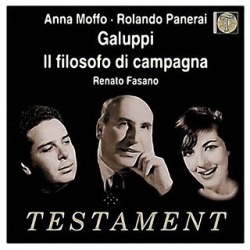Baldassare Galuppi - Il Filosofo di Campagna (2007)
Baldassare Galuppi - Il Filosofo di Campagna (2007)

1 Introduzione (1:54)
2 Candidetto gelosomina (1. Akt) (4:38)
3 Di questa poverella (5:32)
4 Quando son giovine (1:17)
5 Son fresca, son bella (2:51)
6 Non raccoglie le mie foglie (4:11) play
7 La mia ragion è questa (2:50)
8 Anima vile, ingrata (2:35)
9 Se voi m'amate (2. Akt) (7:25)
10 Il signor Don Tritemio è cittadino (2:06)
11 Vedo quell'albero (5:10)
12 Compatite, signor, s'io non so (3:58)
13 Son pien di giublio (4:31) play
14 Amo se vuoi così (3. Akt) (5:27)
15 Se non sei nata nobile (3:40)
16 Lieti canori augelli (4:12)
17 Corpo di satanasso! (2:20)
Eugenia (Don Tritemio's daughter) - Anna Moffo
Lesbina (Eugenia's maid) - Elena Rizzieri
Rinaldo (Eugenia's lover) - Florindo Andreolli
Nardo (a rich farmer, known as "the philosopher") - Rolando Panerai
Don Tritemio (Eugenia's father) - Mario Petri
Instrumental Group of the Collegium Musicum Italicum
I Virtuosi di Roma
Renato Fasano - conductor, 1959
Baldassarre Galuppi (18th October 1706-3rd January 1785) was an Italian composer from Venice, noted for his operas, particularly opera buffa.
He was born on the island of Burano in the Venetian Lagoon, as a result of which he became known as Il Buranello. His first attempt at opera, La fede nell’incostanza ossia gli amici rivali (1722) was a spectacular failure, being hissed off the stage. He subsequently studied music with Antonio Lotti, and, after a brief period in Florence working as a harpsichordist, returned to Venice for another attempt at opera. This time, his opera seria Dorinda (1729) was a success and launched his theatrical career.
In 1740 he was appointed music director of the Ospedale dei Mendicanti, and he worked at St Mark’s in Venice from 1748, being appointed maestro di cappella, considered Venice’s top musical post, there in 1762. He lived and worked for most of his life in Venice, though from 1741 to 1743 he worked in London and from 1765 to 1768 he worked for Catherine the Great in St Petersburg.
His first opera buffa was L’Arcadia in Brenta (1749). This was also his first collaboration with librettist Carlo Goldoni, with whom he produced a number of operas. These works were very popular, with Il filosofo di campagna (1754) a particular success. ---last.fm
Playwright Carlo Goldoni and composer Baldassare Galuppi collaborated on a number of operas, and the most successful was the comedy Il Filosofo di Campagna (1754). Although there is no indication in any of the skimpy packaging information, this is a disc of excerpts, not the complete opera, which lasts close to three hours.
The selections are about evenly divided between recitatives, arias, and ensembles. The lively comic performances of soprano Anna Moffo and baritone Rolando Panerai are the CD's strongest selling points. Both are wonderfully convincing comedians, and their voices are world-class -- full, warm, and ringing. Renato Fasano, leading the Complesso Strumentale del Collegium Musicum Italicum and I Virtuosi di Roma, contributes a brilliant and fleet accompaniment. The recording departs from the score in casting Rinaldo, the hero, as a tenor rather than a soprano, an entirely justifiable decision, but Florindo Andreolli's light and feminine-sounding voice doesn't begin to stand up next to Panerai's or Moffo's.
The opera itself is light and vivacious, with strong vocal characterizations, memorable melodies, and many sly comic touches in its orchestration; it would be easy to imagine it's holding the stage if it were revived with singers and a director skilled in comedy. The sound is amazingly clean and present for a recording of this vintage. This disc of excerpts is like a tasty appetizer, which may prompt listeners to seek out a complete recording. --- Stephen Eddins, allmusic.com
Baldassare Galuppi (ur. 18 października 1706, zm. 3 stycznia 1785) – włoski (wenecki) kompozytor późnego baroku.
Urodził się na wyspie Burano na weneckiej lagunie, dlatego nazywano go często Il Buranello. Jego pierwszą operą była: La fede nell'incostanza ossia gli amici rivali (1722), która niestety została wygwizdana. Następnie Galuppi został uczniem Antonio Lottiego, i po krótkim pobycie we Florencji i pracy tam jako klawesynista, powrócił do Wenecji. Tym razem jego opera seria Dorinda (1729) była sukcesem.
W roku 1740, został dyrektorem muzyki w Ospedale dei Mendicanti, a od 1748 pracował w Bazylice Św. Marka jako maestro di cappella. W latach 1741-1743 przebywał w Londynie, a w latach 1765-1768 Katarzyna Wielka zatrudniała go w Petersburgu. Większość życia Galuppi spędził jednak w rodzimej Wenecji.
Galuppi uprawiał nowy gatunek opery – operę komiczną (opera buffa). Pierwszym dziełem tego gatunku, jakie stworzył była L'Arcadia in Brenta (1749). Tak rozpoczęła się jego długoletnia współpraca z librecistą i dramaturgiem Carlo Goldonim, której owocami była m.in. sławna opera "Filozof wiejski" (Il filosofo di Campagna – 1754). W kolejne operach: L'amante di tutte (1760) i I tre amanti ridicoli (1761) Galuppi wykorzystywał libretta swojego syna Antonia, który pisał pod pseudonimem A. Liteo.
download (mp3 @192 kbs):
uploaded yandex 4shared mega mediafire zalivalka cloudmailru oboom uplea
Zmieniony (Środa, 19 Sierpień 2015 19:53)








